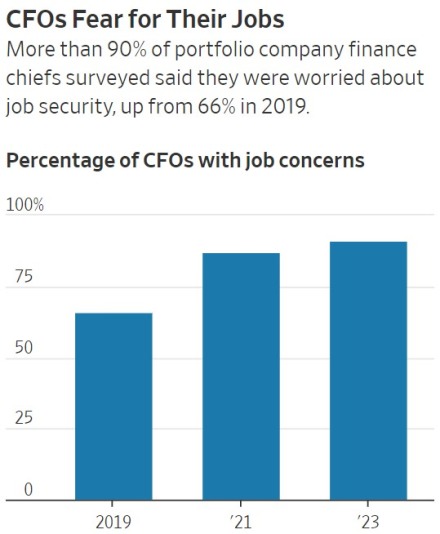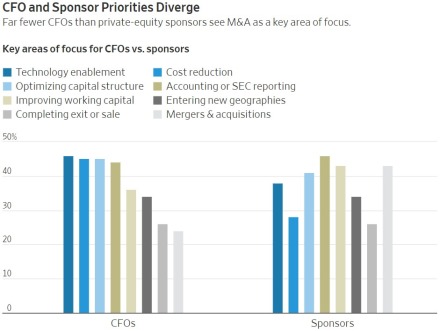Pressure Mounts on Private Equity-Backed Company Finance Chiefs as Market Shifts
As Seen in: The Wall Street Journal
Almost all CFOs of private-equity portfolio companies worry about job security after a buyout firm arrives, a survey shows

As private-equity firms intensify their focus on performance of businesses they back, the finance chiefs at those companies increasingly feel the heat to deliver as markets shift.
“CFOs are under more pressure than ever before,” said Nick Leopard, chief executive of private markets consulting firm Accordion. “They’re not expected to [just] close the books anymore. They need to be more focused on strategic issues.”
That pressure translates to job security concerns. In a recent Accordion survey of 200 finance chiefs and private-equity sponsors, 91% of CFOs said they worried about their jobs following a private-equity investment in their employer, up from 87% of CFOs in a similar Accordion survey in 2021 and 66% surveyed in 2019.
Higher interest rates combined with economic uncertainty and a slowdown in private-equity deal making have forced private-equity firms, and subsequently CFOs of portfolio companies, to focus more intently on increasing or sustaining cash flow, according to private-equity professionals, company finance chiefs and consultants. As a result, more fund sponsors want CFOs that can identify and implement strategic business initiatives to drive that growth in addition to performing more traditional reporting and finance tasks.
 “In 2021 I would argue that a lot of the focus was outward facing, whether that was through inorganic growth at the portfolio company or whether it was a larger exit strategy,” said Henry Neely, chief financial officer at Specialty1 Partners, a network of dental surgery practices backed by private markets firm VSS.
“In 2021 I would argue that a lot of the focus was outward facing, whether that was through inorganic growth at the portfolio company or whether it was a larger exit strategy,” said Henry Neely, chief financial officer at Specialty1 Partners, a network of dental surgery practices backed by private markets firm VSS.
“Now, in 2023 with interest rates the way they are, a lot more [of the focus] is inward facing,” he said. “How can we add value to the company? How can we grow the company, reduce costs [and] grow profits [or] grow Ebitda?”
However, finance chiefs and private-equity sponsors don’t always agree on where to focus their time and energy to achieve those objectives, particularly when it comes to acquisitions or cutting costs.
Among company CFOs surveyed by Accordion, only 24% cited acquisitions as a key focus compared with 43% of the private-equity executives surveyed. By contrast, finance chiefs put a much greater emphasis on cost reductions, with 45% surveyed listing those efforts as a key priority compared with 28% of fund executives.
Private-equity firms have turned to smaller, tuck-in acquisitions to expand the companies they back as debt remains expensive and valuations for many larger businesses remain elevated. But some company CFOs are so used to focusing on managing day-to-day operations that they struggle to adapt to a sponsor’s more expansive objectives, according to Neely, who worked at several other private equity-backed companies before joining Specialty1.
“[CFOs may think] I don’t even have my house in order yet and you want me to go look at this other house that you potentially want to buy?” he said.
Specialty1 has been an active acquirer of dental practices, picking up more than 100 smaller operations in less than three years, according to Neely.
He and other company finance chiefs said that regular and effective communication between fund executives and portfolio company CFOs remains more important than ever to align business goals.
“For me that communication, especially early on, needs to be happening every couple of weeks, just a 30-minute or an hour call,” Neely said. “That for me has been fundamental to having a successful relationship with private-equity sponsors.”
Keith Gee, co-managing partner and CFO at TPG-backed Cinespace Studios, said that regular communication with the buyout firm has been critical as the company has navigated not only challenging market conditions but also entertainment talent strikes that hobbled the industry earlier this year. Acquired by TPG in 2021, Cinespace operates studio and support facilities for the film, television and digital media production industries.
“Through every step of the way, not two or three days go by where we’re not having a conversation about something,” Gee said about TPG. “We often come to conversations with different points of view, but we listen to each other. We learn from each other and we make decisions [together].”
Aaron Miller, a partner at Apollo Global Management and head of a team at Apollo that provides resources and support to portfolio companies, said that communication is particularly important when things at a company don’t go as planned.
“Sharing bad news late was, is and probably forever will continue to be the biggest mistake that CFOs make…sharing bad news late or not sharing it at all,” he said.






